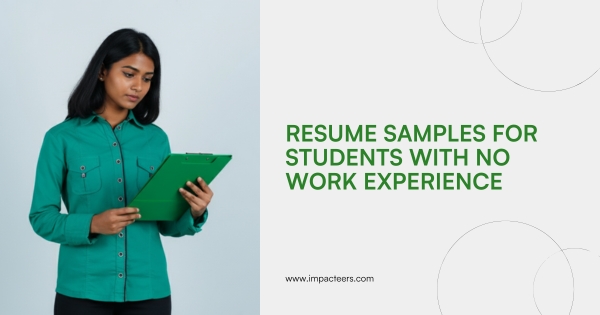Discover how to prepare for any interview with our complete guide

Preparing for an interview is like preparing for a big performance, the more confident and rehearsed you are, the better you’ll deliver. Whether you’re a fresher from an engineering background, someone with Java development experience, or preparing for a casual walk-in interview, the key lies in mastering the interview preparation process. Let’s explore a complete guide covering everything from expected questions and answers to behavioral tips, so you can prepare smarter and walk into any job interview ready to impress.
“Create stunning, job-winning resumes in minutes with Impacteers Resume Builder – trusted by freshers and professionals to stand out and land interviews faster!”
Understand the Interview Process First
Interviews are often broken into stages. Understanding each step helps ease the tension. Typically, the process includes:
- Application Review: Recruiters shortlist your resume.
- Phone Screening: Quick 15-20 min calls to verify your profile and gauge your interest.
- Technical Rounds: For engineering or IT roles, expect coding problems or tech assessments.
- HR Interview: Focuses on personality, cultural fit, and your long-term aspirations.
Each company has its version, but the core structure remains quite similar. Some may even include walk-in interviews, which are shorter and more informal but still need preparation.
Start with Thorough Company Research
Before answering any questions or even walking into the interview room, research the company like a pro:
- Company Website: Learn about their mission, values, and services.
- Recent News: Mention current developments or awards to show you’re updated.
- Glassdoor or AmbitionBox: Read interview experiences from other candidates.
This will help you tailor your answers and ask smart, specific questions at the end.
Types of Interviews You Must Be Ready For
Not all interviews are the same. Be ready for different formats:
| Type | Details |
| Face-to-Face | Traditional and detailed, common in final rounds |
| Telephonic | Initial screening, brief and to the point |
| Video Interview | Increasingly popular via Zoom, Google Meet, etc. |
| Walk-in Interview | Casual, often held at company premises for mass hiring |
| Group Discussions | Common in freshers’ interviews, tests communication skills |
| Technical Round | Java, coding, algorithms, or system design for engineers |

Common Interview Questions and Sample Answers
Here are universal questions you’ll likely face in any interview, with tips to answer effectively:
1. Tell me about yourself.
Answer Tip: Start with your academic background, job experience, skills, and end with why you’re applying. Tailor it for the role.
2. Why do you want to work here?
Answer Tip: Link your career goals with the company’s mission or culture. Show how you can contribute.
3. What are your strengths and weaknesses?
Answer Tip: Choose real strengths. For weaknesses, pick one and show how you’re improving.
4. Describe a challenge and how you handled it.
Answer Tip: Use the STAR method — Situation, Task, Action, Result.
5. Why should we hire you?
Answer Tip: Summarize your unique skills, experiences, and how they match the job’s requirements.
For technical roles (especially Java or engineering jobs), expect questions like:
- Explain OOP concepts in Java.
- What’s the difference between an abstract class and interface?
- How do you handle memory leaks in Java?
Prepare short and clear explanations, and practice them out loud.
Prepare for Interview: Tips for Freshers
If you’re a fresher, you might not have work experience, but you can still impress with preparation:
- Know your resume inside out: Be ready to discuss your projects and internships.
- Brush up on academic basics: For engineering roles, be ready with core concepts.
- Practice mock interviews: Use platforms or friends to simulate the environment.
- Be enthusiastic: Energy and attitude often outweigh lack of experience.
For Experienced Professionals: Focus on Your Journey
When you have work experience, the panel expects depth:
- Speak in metrics: “Increased sales by 25%” sounds stronger than “Did well.”
- Prepare a career narrative: Tie your past roles into a cohesive story.
- Handle job switches smartly: If you changed jobs frequently, explain with purpose.
What to Wear and Carry for the Interview
First impressions are visual. Here’s a checklist:
- Wear formal clothes: Suit or crisp shirt with trousers. Keep it neutral.
- Carry documents: Resume (multiple copies), ID, certifications, and portfolio (if applicable).
- Bring a notebook and pen: Shows you’re attentive.
Mock Interviews and Practice PDFs
- Download PDFs: Many online portals provide free interview preparation PDFs with questions and model answers. These are perfect for offline study.
- Use mock interview apps: Apps like Pramp, InterviewBuddy, or PrepInsta help simulate real scenarios.
How to Answer Behavioral Questions
Behavioral questions explore how you react to real-world situations. Common formats:
- Tell me about a time you failed.
- How do you handle conflict in a team?
- Describe your leadership experience.
Use the STAR format for each answer:
- Situation: Describe the context.
- Task: What was expected?
- Action: What did you do?
- Result: What happened?
How to Ask Smart Questions at the End
Interviews end with: “Do you have any questions for us?”
Never say “No.” Instead, ask:
- What does a typical day look like in this role?
- How is performance measured here?
- What are the growth opportunities?
This shows interest, not desperation.
Final Hour Checklist Before Your Interview
A last-minute rundown:
Resume printed (2-3 copies)
Clean outfit prepared
Documents in a folder
Re-read the job description
Check location and time
Practice greeting and smile
Downloadable Checklist for Your Interview Preparation (PDF)
To keep everything in one place, consider downloading or creating a PDF checklist covering:
- Required documents
- Practice questions
- Links to resources
- STAR examples
It’s a great tool, especially when you’re preparing for multiple jobs.
Red Flags to Avoid During the Interview
Even experienced candidates make these mistakes:
- Speaking negatively about past employers
- Not making eye contact
- Over-talking or under-explaining
- Not knowing the job description
- Lying or exaggerating
Keep it honest, clear, and respectful.

Prepare for Interview: Virtual Interview Preparation Tips
Online interviews require a few extras:
- Test your internet and webcam
- Use headphones
- Pick a quiet, well-lit room
- Dress professionally even if it’s virtual
- Have your resume open for reference
What if You Don’t Know the Answer?
Don’t panic. Say:
- “That’s a great question. I’d like to take a moment to think.”
- “I haven’t worked with that, but I’m eager to learn.”
- “Based on my understanding, I would approach it this way…”
Interviewers appreciate honesty over guessing.
Post-Interview: What to Do Next
Once the interview ends:
- Send a thank-you email: Within 24 hours, thank the panel and reaffirm your interest.
- Reflect: What went well? What could improve?
- Follow up: If you don’t hear back in 7-10 days, a polite follow-up is okay.
Create stunning, job-winning resumes in minutes with Impacteers Resume Builder – trusted by freshers and professionals to stand out and land interviews faster!
Frequently Asked Questions
1. What is the best way to prepare for an engineering interview?
Start by mastering your core subjects, review your projects, and practice technical questions related to your branch. For CS roles, Java and DSA are key.
2. What are the top 3 things interviewers look for?
Communication, confidence, and clarity. Add relevant skills and cultural fit to that list.
3. Can freshers crack walk-in interviews?
Absolutely. With the right preparation and attitude, walk-ins are often the easiest entry point for freshers.
4. Should I memorize answers to common questions?
No, understand the structure and intent behind each answer instead of memorizing word-for-word.
5. What are good websites to download interview preparation PDFs?
Check out PrepInsta, GeeksforGeeks, and InterviewBit for free, high-quality PDFs.
learn More >>> https://blog.impacteers.com
About Us >>> https://www.impacteers.com



Post Comment